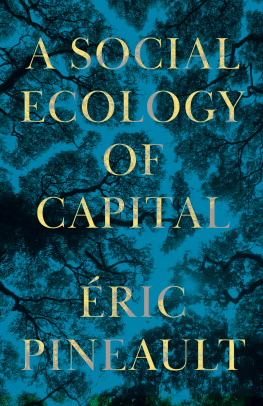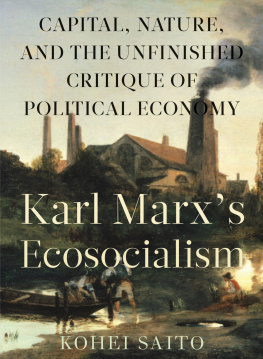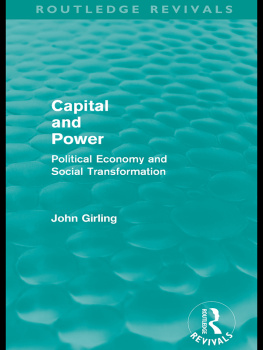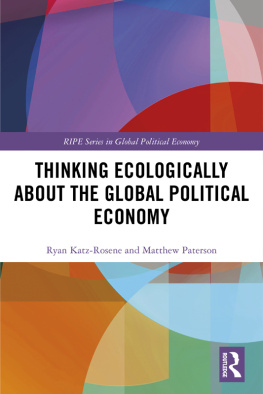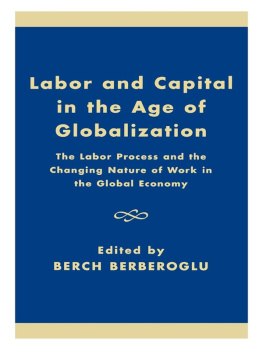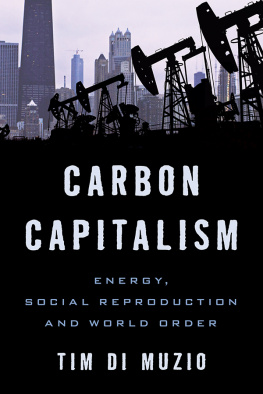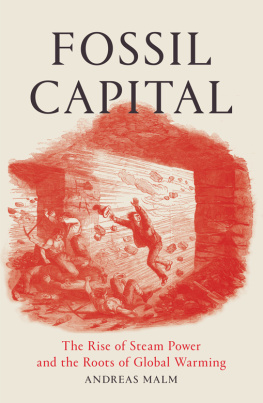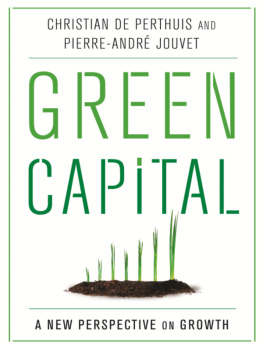Contents
Guide
A Social Ecology of Capital
With A Social Ecology of Capital, ric Pineault provides a remarkably insightful analysis of the complex interface between capital and nature. This is indispensable reading for scholars, students and activists.
William Carroll, Professor of Sociology, University of Victoria, Canada
A Social Ecology of Capital is essential reading for all interested in ecological crises, limits to growth, and alternatives. Its materialist-feminist analysis of growth as biophysical expansion and accumulation presents a much-needed foundation for understanding our current predicament.
Matthias Schmelzer, author of The Hegemony of Growth
A timely and urgent analysis which seeks to comprehend our ecological plight through an elucidation of monopoly capital.
Gareth Dale, Reader in Political Economy, Brunel University
In systematically illuminating the material flows and constraints of fossilfueled capitalism, Pineault has compiled a useful guide to social metabolism for Marxists. He shows that, to understand our global ecological predicament, we must go beyond Marx in establishing a materialist social science.
Alf Hornborg, Professor Emeritus of Human Ecology, Lund University and author of The Magic of Technology: The Machine as a Transformation of Slavery
Social ecology is further developed by ric Pineault with this fascinating theoretical and empirical study. He shows how capital as a social relation exercises its dominationand how contested this is. A must read for scholars, students, activists, progressive politicians and the interested public!
Ulrich Brand, University of Vienna and co-author of The Imperial Mode of Living. Everyday Life and the Ecological Crisis of Capitalism
Eric Pineaults book is a true Capital in the 21st Century. One where ecology matters.
Giorgos Kallis, ICREA Professor, ICTA-UAB
A Social Ecology of Capital
ric Pineault

First published 2023 by Pluto Press
New Wing, Somerset House, Strand, London WC2R 1LA
and Pluto Press Inc.
1930 Village Center Circle, 3-834, Las Vegas, NV 89134
www.plutobooks.com
Copyright ric Pineault 2023
The right of ric Pineault to be identified as the author of this work has been asserted in accordance with the Copyright, Designs and Patents Act 1988.
British Library Cataloguing in Publication Data
A catalogue record for this book is available from the British Library
ISBN 978 0 7453 4377 8 Paperback
ISBN 978 0 7453 4381 5 PDF
ISBN 978 0 7453 4379 2 EPUB
This book is printed on paper suitable for recycling and made from fully managed and sustained forest sources. Logging, pulping and manufacturing processes are expected to conform to the environmental standards of the country of origin.
Typeset by Stanford DTP Services, Northampton, England
Simultaneously printed in the United Kingdom and United States of America
Contents
List of Figures
List of Tables
Acknowledgments
The social ecology of capital as it stands is an unfinished project. I have been able to propose an introductory exploration of the theory and empirics needed to understand the workings and trajectory of the social metabolism of advanced capitalism. I hope the reader will find in this work elements and ideas that will inspire further analysis in a systematic and fruitful direction. I have gathered together strands of research and results from the burgeoning field of the metabolic and biophysical analysis of the economic process, which I have combined with the critical political economy of advanced capitalism in what I hope to be a framework that is both coherent, original and relevant to current socio-ecological struggles. My debt to the Vienna Institute of Social Ecology is immense, they have opened the way for an empirically grounded assessment of the materiality of capitalist accumulation. The data mobilized in this work wouldnt exist without their painstaking and rigorous empirical research as well as the visionary methodological and epistemological advances on which their research is founded. I sincerely hope that my attempt to synthesize their findings inside a critical economic theory of capitalist accumulation contributes to the development of their research program.
My work is also inspired by the activists in Quebec and elsewhere with whom I have worked and stood shoulder to shoulder and heart to heart to block, transform and shape the social metabolism of the future in struggles against the construction and promotion of fossil-fuel infrastructures as well as in struggles to define a socially just ecological transition based on the principles of degrowth.
I have written this work haunted by a sentence from Murray Bookchin, to whose memory this book is dedicated. It was during a casual conversation between mentor and student sitting on the porch of a convenience store in Plainfield Vermont in the early 1990s, drinking soda of all things! Every summer young radical ecologists from all over the Americas and elsewhere would converge to study at the Institute of Social Ecology in this little village lost in the Green Mountains. Eric, we dont know what capitalism is yet. The sentence later found its way into one of his essays. It was in this way that Bookchin introduced me and others to a dialectical mode of approaching socio-ecological theory. Things are not fixed essences, they become. I guess we will only know in hindsight what capitalism as a social formation was. Bookchins enigmatic statement is paradoxically for me a beacon of hope. There will be a society which will have experienced and survived a historical trajectory beyond capitalist accumulation and its destructive ecological relations. I hope with this work to have contributed a bit to the collective understanding of this social and ecological formation and to that of its limits. I am very aware that I have not been able to do justice in these pages to Murrays pioneering and essential contribution to the development of social ecology as a critical theory and practice of societal transformation. I hope he would agree that what follows is nevertheless a contribution to his politics of emancipation and is inspired by his dialectics. Of course, I fully assume the shortcomings of what I have been able put together. Parts of this book have been drawn from previously published articles, in particular
This work would not have been possible without the support of Klaus Dorre, Stephen Lessenich, Hartmut Rosa and their companions at the Postwachstumgesellschaften Institute at the University Friedrich Schiller of Jena, Germany. They generously received me and my family during a full year for a sabbatical leave in 20182019 where I was able to engage in the fundamental research out of which this book grew. It also grew out of discussions with Dennis Eversberg, Matthias Schmelzer, Emma Dowling, Ulrich Brand and others during this stay in Jena, as well as with researchers at the Institute of Social Ecology in Vienna. I would also like to thank Gareth Dale who closely read and commented on this manuscript, as well as the people at Pluto Press that supported this project throughout its long period of gestation.
______________________
. The words are from Bruce Springsteens song We Are Alive, from his album Wrecking Ball.
.
.

